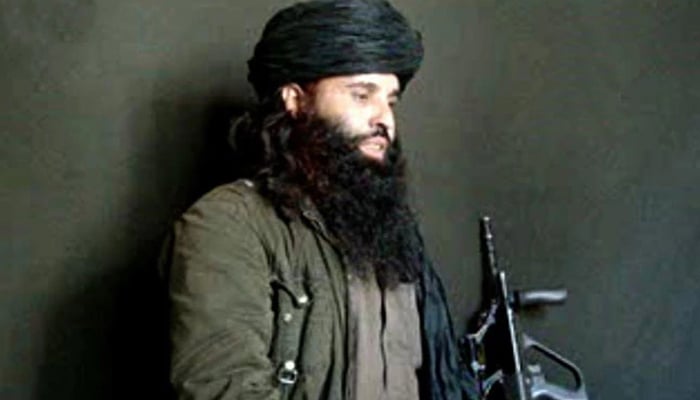The end of Fazlullah
There will be some relief this Eid in Pakistan that the notorious ‘Radio Mullah’ Fazlullah is no more, with the Afghan Ministry of Defence now confirming that TTP chief Mullah Fazlullah was killed in a US drone strike in the Kunar province on Wednesday. Fazlullah, best known for his barbaric reign of Swat in the months before he was ousted by a military operation in 2009, was appointed leader of the TTP in 2013 after Hakeemullah Mehsud was killed – also in a US drone strike. As leader of the TTP, Fazlullah had orchestrated a number of attacks on Pakistani soil. Known for his fiery sermons over an illegal FM radio station in Swat, Fazlullah was also believed to be the man behind the shooting of Malala Yousafzai and two other girls in October 2012. During his rule in Swat, he was responsible for numerous atrocities including the burning down and closure of schools for girls and the beheading of people in public. The news that he has been killed will, therefore, be met with some rejoicing in his home area. There were many who still feared a possible return of the Taliban at some point in the future.
The killing of Fazlullah on Afghan soil also confirms Pakistan’s long-standing position that Afghan soil has been used as a haven by the Pakistani Taliban. Fazlullah’s name was included in a list presented to the Afghan military a year ago of TTP leaders that are considered to be taking refuge inside Afghanistan. While it is unfortunate that Fazlullah was taken out by a US drone attack rather than by Pakistan, with the Afghan defence ministry claiming that this was a joint Afghan-US operation, Fazlullah’s killing is a much needed opening for Pakistan and Afghanistan to rebuild trust. In fact, the TTP’s response – accusing Afghan intelligence service NDS of providing the information that led to the drone attack – in itself could provide us with an opportunity. Considering the previous misgivings regarding the NDS, perhaps it is time to take advantage of the situation and bring down the TTP through mutual cooperation. In March this year, Fazlullah’s son was among 20 TTP fighters killed in Kunar. These operations against TTP terrorists point to a willingness on the part of both the US and Afghanistan to target militants who attack Pakistan. This is the kind of cooperation that is needed, instead of the regular blame game that goes on between Pakistan and Afghanistan.
The reality is that terrorist groups present a threat to both countries. Peace in the two countries can only be guaranteed if Pakistan and Afghanistan work together to root out terrorism. Both countries should also be on guard for retaliatory attacks from the TTP. Even though it has become a relative non-entity, the terror organisation still holds some influence, and according to reports, allies itself with other groups active in Pakistan including the Daesh and the Lashkar-e-Jhangvi. This is the time to act decisively against the TTP. We could eliminate a significant threat to Pakistan if we make the right moves diplomatically and militarily.
-
 Paul McCartney Talks 'very Emotional' Footage Of Late Wife Linda In New Doc
Paul McCartney Talks 'very Emotional' Footage Of Late Wife Linda In New Doc -
 Princess Beatrice, Princess Eugenie's Response To Andrew's Arrest Revealed
Princess Beatrice, Princess Eugenie's Response To Andrew's Arrest Revealed -
 King Charles And Princess Anne Bestow Honours At Windsor Castle
King Charles And Princess Anne Bestow Honours At Windsor Castle -
 King Charles 'worried' As Buckingham Palace, Royal Family Facing 'biggest Crisis'
King Charles 'worried' As Buckingham Palace, Royal Family Facing 'biggest Crisis' -
 Milo Ventimiglia Recalls First Meeting With Arielle Kebbel On The Sets Of 'Gilmore Girls' Amid New Project
Milo Ventimiglia Recalls First Meeting With Arielle Kebbel On The Sets Of 'Gilmore Girls' Amid New Project -
 Eric Dane Infuriated After ALS Diagnosis As He Feared The Disease Would Take Him Away From His Girls
Eric Dane Infuriated After ALS Diagnosis As He Feared The Disease Would Take Him Away From His Girls -
 It's A Boy! Luke Combs, Wife Nicole Welcome Third Child
It's A Boy! Luke Combs, Wife Nicole Welcome Third Child -
 Leading Astrophysicist Shot Dead At Southern California Home
Leading Astrophysicist Shot Dead At Southern California Home -
 Johnny Depp's Kind Gesture Towards Late 'Grey's Anatomy' Actor Eric Dane Before Death Laid Bare
Johnny Depp's Kind Gesture Towards Late 'Grey's Anatomy' Actor Eric Dane Before Death Laid Bare -
 How Princess Eugenie, Beatrice React To Andrew Arrest?
How Princess Eugenie, Beatrice React To Andrew Arrest? -
 Kylie Jenner 'convinced' Gwyneth Paltrow Is 'crushing' On Timothee Chalamet: 'It's Disrespectful'
Kylie Jenner 'convinced' Gwyneth Paltrow Is 'crushing' On Timothee Chalamet: 'It's Disrespectful' -
 Gemma Chan Reflects On 'difficult Subject Matter' Portrayed In 'Josephine'
Gemma Chan Reflects On 'difficult Subject Matter' Portrayed In 'Josephine' -
 Blood Falls In Antarctica? What Causes The Mysterious Red Waterfall Hidden In Ice
Blood Falls In Antarctica? What Causes The Mysterious Red Waterfall Hidden In Ice -
 AI Power Play: Nvidia Moves To Invest $30 Billion In OpenAI
AI Power Play: Nvidia Moves To Invest $30 Billion In OpenAI -
 Will Savannah Guthrie Ever Return To 'Today' Show? Here's What Insiders Predict
Will Savannah Guthrie Ever Return To 'Today' Show? Here's What Insiders Predict -
 Andrew Mountbatten-Windsor In A Fix Over New Disturbing TMZ Photos
Andrew Mountbatten-Windsor In A Fix Over New Disturbing TMZ Photos




